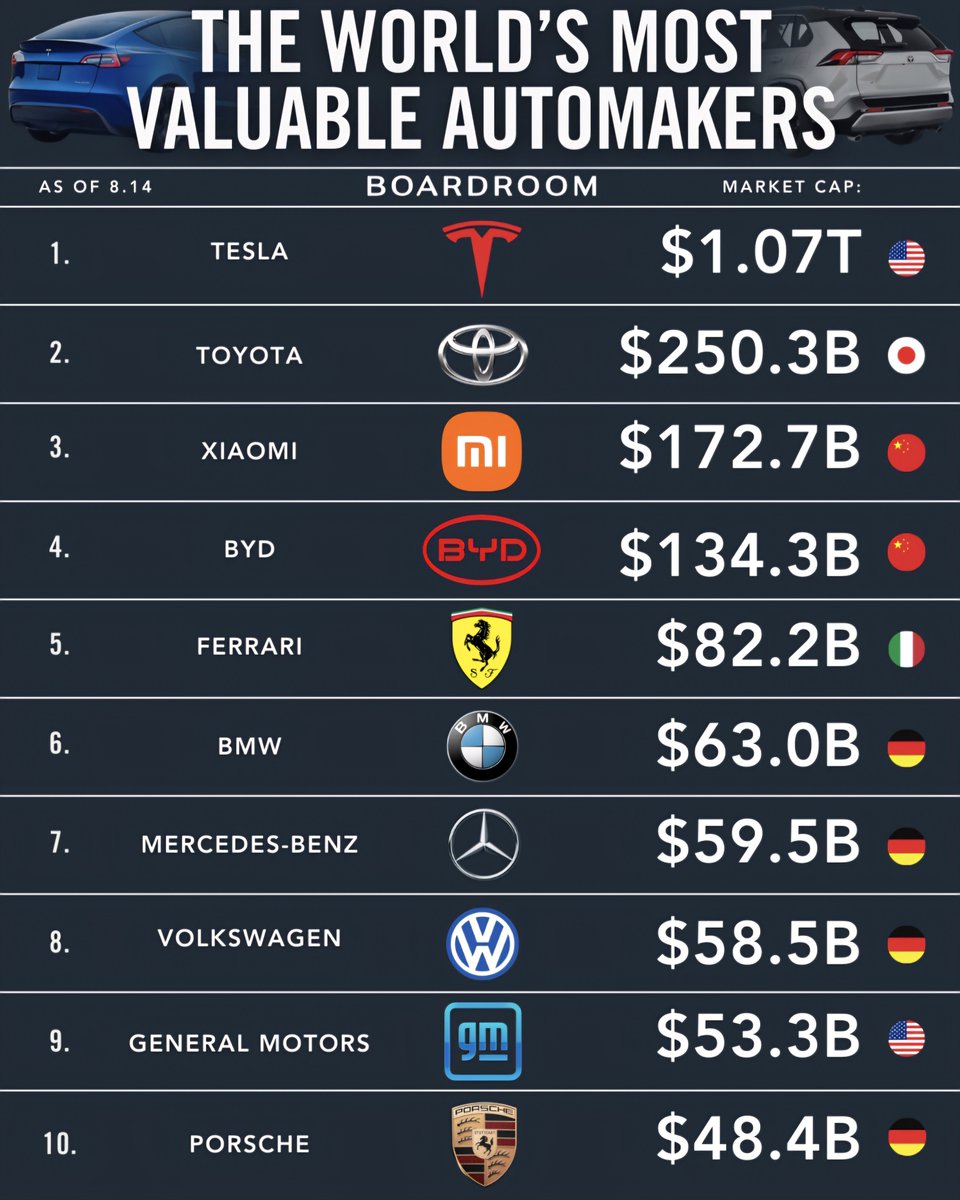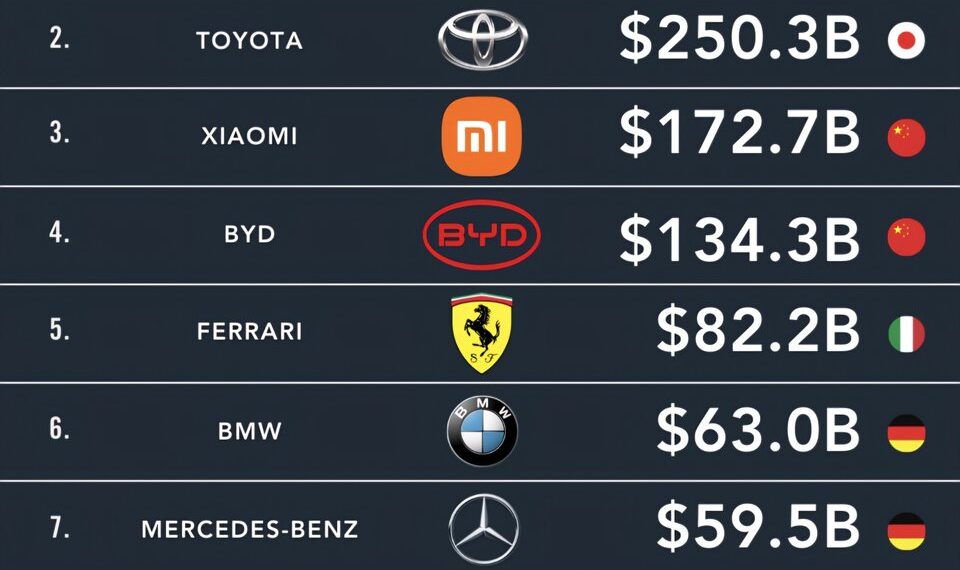Select Language:
Tesla Leads the Charge: The World’s Most Valuable Automakers in 2025

1. Tesla: A Pioneering Force in Electric Vehicles
Tesla continues to dominate the global auto industry with its innovative approach to electric vehicles (EVs). In 2025, Tesla’s market valuation has soared beyond $1.2 trillion, solidifying its position as the most valuable automaker in the world. The company’s commitment to sustainable energy, cutting-edge battery technology, and expanding product lineup—including the Model S, 3, X, Y, and upcoming Cybertruck—has cemented its reputation as a leader in the EV revolution. Tesla’s global charging infrastructure and strong brand loyalty have set it apart from traditional automakers.
2. Toyota: The Hybrid Innovator Adapting to New Markets
Toyota remains a powerhouse in the auto industry, valued at over $280 billion in 2025. While the company was historically known for its reliable gasoline-powered cars, it has successfully transitioned into the electric and hybrid markets. Toyota’s hybrid models like the Prius and RAV4 Hybrid are still popular worldwide, but its aggressive investment in solid-state battery technology and increased EV offerings have kept it competitive. Toyota’s emphasis on durability, affordability, and innovation ensures its place among the top automakers.
3. Volkswagen Group: Europe’s Automotive Heavyweight
With a valuation exceeding $130 billion, Volkswagen Group continues to hold its position as Europe’s leading automaker. The company’s extensive portfolio includes Volkswagen, Audi, Porsche, Lamborghini, and Bentley, covering everything from economy vehicles to luxury sports cars. Volkswagen’s focus on electrification—with its ID series—has gained significant traction, making it a key player in Europe’s push toward sustainable mobility. The group’s global presence and wide product range underpin its enduring influence.
4. BYD: The Chinese EV Powerhouse
Byd (Build Your Dreams) has risen rapidly to become one of the most valuable automakers, valued at over $90 billion. As China’s top EV manufacturer, BYD has expanded globally, competing fiercely with Western brands. Its diversified approach includes electric buses, trucks, and passenger vehicles, emphasizing affordability and innovation. BYD’s advanced battery technology and strategic partnerships with global tech firms have propelled it toward international markets.
5. Hyundai Motor Group: South Korea’s Automobile Giant
Valued at around $70 billion in 2025, Hyundai Motor Group has cemented its position as a leading global automaker. The company’s focus on affordable electric vehicles, like the Ioniq series and Kia models, combined with advancements in hydrogen fuel cell technology, has attracted environmentally conscious consumers worldwide. Hyundai’s aggressive push into autonomous driving and smart mobility solutions ensures its continued growth.
6. Mercedes-Benz: Luxury and Innovation
Mercedes-Benz, with a valuation near $60 billion, remains synonymous with luxury, performance, and cutting-edge technology. Its EQ series of luxury EVs has elevated the brand’s position in a competitive market. Mercedes’ investments in electric architecture, sustainability initiatives, and autonomous vehicle capabilities reflect its strategic focus on future mobility. The brand’s reputation for quality and innovation continues to appeal to affluent consumers globally.
7. Honda: Tradition Meets Modernity
Honda holds a valuation of more than $50 billion, maintaining its reputation for dependable vehicles. The company has shifted focus toward electrification, with plans to phase in more battery-electric and hybrid models over the next few years. Honda’s strength lies in its fuel-efficient engines and durable build quality, making it a favorite in North America and Asia. Its extensive research into next-gen mobility solutions like mobility-as-a-service keeps Honda relevant.
8. Stellantis: The Merged Powerhouse
Stellantis, formed from the merger of Fiat Chrysler and PSA Group, is valued at around $45 billion. The company boasts a broad brand portfolio that includes Jeep, Dodge, Ram, Peugeot, and Opel. Stellantis is investing heavily in electrification and connectivity, aiming to leverage its diverse assets and expand its presence in emerging markets. Its strategy combines traditional strength with a focus on sustainable vehicle development.
9. BMW Group: The Innovator in Luxury Mobility
With a valuation near $40 billion, BMW remains a leader in luxury mobility. The company is heavily investing in its i-series electric vehicles and new autonomous-driving technologies. BMW’s focus on delivering an exceptional driving experience combined with innovative design continues to attract premium buyers. Additionally, its expanding efforts in sustainability and connected car ecosystems demonstrate its forward-looking strategy.
10. Ford Motor Company: Classic Meets Contemporary
Ford rounds out the top ten with a valuation of over $36 billion in 2025. The legendary American automaker has transformed itself by ramping up its EV lineup, including the Mustang Mach-E and the electric F-150 Lightning. Ford’s focus on electric trucks and SUVs, alongside its increasing investment in autonomous vehicle technology, positions it as a key player in the future of American mobility.
The automotive industry in 2025 remains dynamic, with legacy automakers innovating alongside new electric-first companies. Tesla’s leadership exemplifies the exponential growth within the EV sector, while traditional companies like Toyota and Volkswagen adapt to a rapidly changing landscape. Chinese firms like BYD demonstrate the rising influence of Asian automakers, signaling a truly global shift towards electrification and sustainable transportation. As technology advances, these market leaders will continue to shape the future of mobility worldwide.







